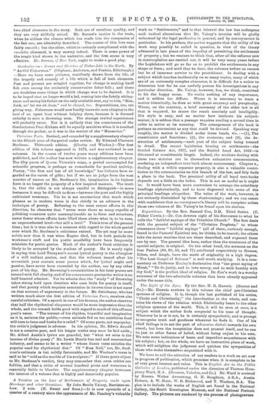Victorian, Poets. Revised, and extended by a supplementary chapter to
the fiftieth year of the period under review. By Edmund Clarence Stedman. Thirteenth edition. (Chatto and Windus.)—The first edition of this volume appeared in 1875, and was reviewed in our columns. In the course of twelve years many editions have been published, and the author has now written a supplementary chapter. The fifty years of Queen Victoria's reign, a period unexampled for scientific progress, is perhaps as remarkable for poetical activity. Poetry, "the first and last of all knowledge," has hitherto been re- garded as the rarest of gifts ; but if we are to judge from the vast number of names on Mr. Stedman's list, imagination in its highest form is no longer the property of a few inspired masters. The truth is, that the critic is not always careful to distinguish—in some instances it may be difficult to do so—between the poet and the highly cultivated verseman. Yet he is not unconscious that much which pleases us in modern verse is due chiefly to an advance in the technique of poetry. Referring to the most recent efforts in this direction, he observes that "never were there so many capable of polishing measures quite unexceptionable as to form and structure, never fewer whose efforts have lifted them above what is, to be sure, an unprecedented level—but still a level." This is true of the present time ; but it is true also in a measure with regard to the whole period over which Mr. Stedman's criticisms extend. The art may be more subtle now than it was when Rogers died, but in both periods the workman's craft and his poetic sensibility have been frequently mistaken for poetic genius. Much of the author's fresh criticism is likely to be accepted by the student of poetry. He is surely right in saying that Lord Tennyson's recent lyrical poetry is the afterglow of a still radiant genius, and that the volumes issued after his seventieth year contain some poems which, for lyrical might and passion, have never been exceeded by the author, nor by any other poet of his day. Mr. Browning's eccentricities in his later poems are treated with full charity, and of his consummate genius the writer is no half-hearted admirer. Yet he admits that the "study" of Browning takes strong hold upon theorists who care little for poetry in itself, and that poetry which requires annotation in its own time is not surer on that account of supremacy in the future. Mr. Swinburne, who has written much since the first edition of Victorian Poets, receives also careful criticism. Of a speech in one of his dramas, the author observes that half the rhythmical eloquence would be more impressive than the whole, and the remark bolds good with regard to much of this affluent poet's verse. "The torrent of his rhythm, beautiful and imaginative as it is, satiates the public,—even animals fed on too nutritious food will turn to bran and husks for a relief." Of some poets, not unpopular, the critic's judgment is adverse. In his opinion, Mr. Edwin Arnold is not a creative poet, and his longer works may soon be laid aside ; Mr. Alfred Austin's lyrics are graceful, but "what we miss is the incense of divine poesy ;" Mr. Lewis Morris has zeal and measureless industry, and seems to be a writer "whose fluent verse satisfies the popular need for rhythmical diet." Of "Boss Neil," too, Mr. Sted. man's estimate is but mildly favourable, and Mr. Woolner's verse is said to be" cold as the marble of his sculpture." If these poets object to Mr. Stedman's verdict, they may remember that even critics are fallible, and that a critic of several hundred poets and versemen is especially liable to blunder. The supplementary chapter increases the interest of a volume that is highly and deservedly popular.


















































 Previous page
Previous page